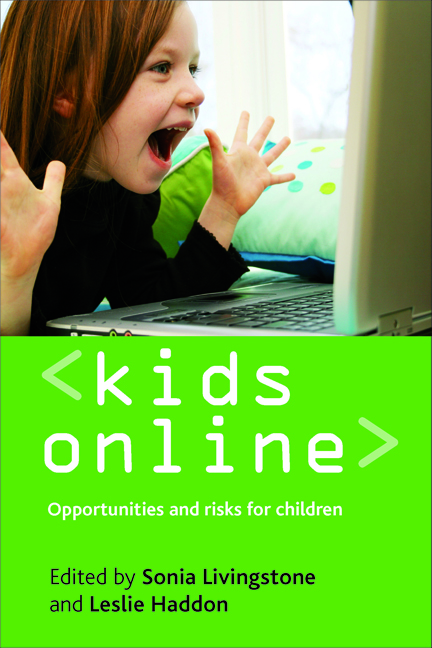Book contents
- Frontmatter
- Contents
- Notes on contributors
- Acknowledgements
- one Introduction
- Section I Researching European children online
- Section II Going online: new opportunities?
- Section III Going online: new risks?
- Section IV Policy implications
- Appendix A List of country codes
- Appendix B Children and parents online, by country
- Appendix C The EU Kids Online network
twelve - Problematic conduct: juvenile delinquency on the internet
Published online by Cambridge University Press: 15 July 2022
- Frontmatter
- Contents
- Notes on contributors
- Acknowledgements
- one Introduction
- Section I Researching European children online
- Section II Going online: new opportunities?
- Section III Going online: new risks?
- Section IV Policy implications
- Appendix A List of country codes
- Appendix B Children and parents online, by country
- Appendix C The EU Kids Online network
Summary
Introduction
Children's participation in the internet revolution is regularly touted as a mixture of societal progress and an invitation to predatory adults and digital criminals. The idea that children can be active participants in a negative sense through illegal or deviant behaviour has received little attention from policy makers, awareness raisers and researchers, although issues such as ‘digital bullying’, ‘happy slapping’ and the illegal downloading of music and movies are starting to creep into the public – and official – consciousness. This chapter therefore focuses on children as online delinquents, actively producing online risks, such as illegal or undesired online content or conduct.
Delinquency is defined as ‘conduct that is out of accord with accepted behaviour or the law’ (Merriam-Webster Online Dictionary, 2008). What is considered delinquent or deviant and thereby constitutes ‘risky behaviour’ will naturally vary across ages, cultures, religions, nations and between people. Within the field of criminology, numerous theoretical approaches have been offered to explain the phenomenon of juvenile delinquency, often differentiated by where one places the cause of the behaviour: with individuals themselves (for example rational choice theory, somatotyping theory), peers (differential association theory), parents and school (social control theory), expectations from others (labelling theory), or the structure of society and culture (strain theory, sub-cultural theory, social ecology) (Jewkes, 2004; Muncie, 2004). The idea of children as potential delinquent participants in society is further complicated by the undefined and culturally fluctuating lines between what one considers ‘a child’, ‘a juvenile’, ‘a youth’ and ‘an adolescent’. While the term ‘children’ is here defined to include all those below the age of 18, in line with the United Nations (UN) definition of the child, the terms have changed over time. Within the field of crime prevention it was not until the Victorian society that the idea of childhood as a separate stage of development in need of special considerations regarding punishment emerged (Jewkes, 2004: 89), thus also making the concept of childhood a social construction, dependent on the society, time and culture it is part of.
Even within the European Union (EU) countries seeking to adopt common legislation and rules where possible, the age of criminal responsibility and prosecution differs remarkably, being evenly spread from eight years old in Scotland to 18 in Belgium (Muncie, 2004: 251).
- Type
- Chapter
- Information
- Kids OnlineOpportunities and Risks for Children, pp. 147 - 158Publisher: Bristol University PressPrint publication year: 2009
- 1
- Cited by

